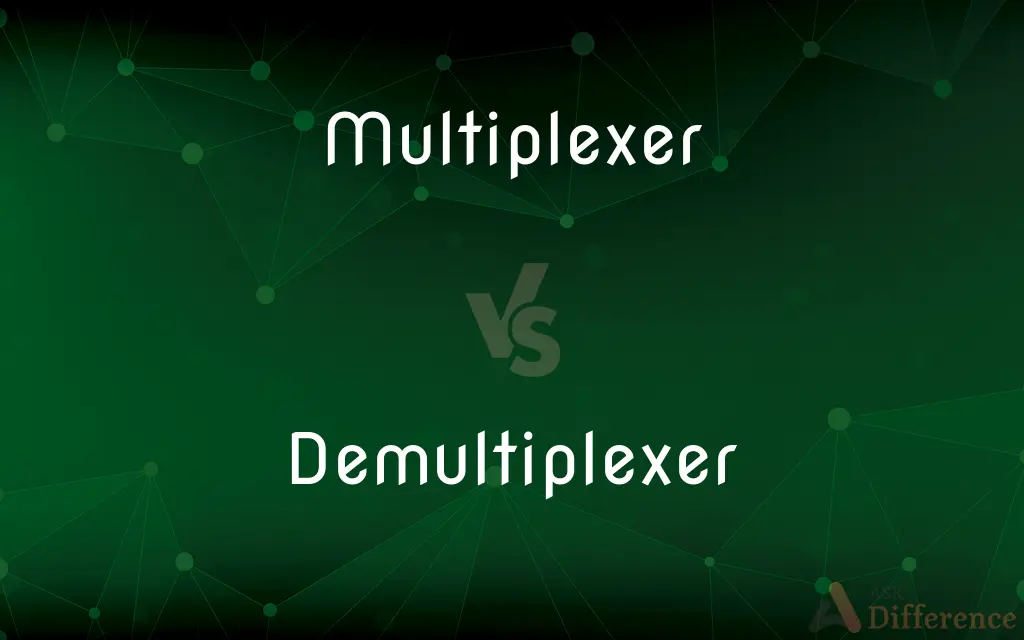Multiplexer vs. Demultiplexer — What's the Difference?
By Tayyaba Rehman — Updated on October 25, 2023
A Multiplexer combines multiple input signals into one output, while a Demultiplexer does the opposite, separating a single input into multiple outputs.

Difference Between Multiplexer and Demultiplexer
Table of Contents
ADVERTISEMENT
Key Differences
A Multiplexer, often abbreviated as MUX, is a device that takes multiple input signals and, based on control inputs, selects one to be transmitted as its output. In contrast, a Demultiplexer, or DEMUX, takes a single input signal and routes it to one of several possible outputs.
The function of a Multiplexer is vital in scenarios where data from multiple sources needs to be transmitted over a single communication channel. However, on the receiving end, a Demultiplexer becomes crucial as it segregates the received data back to its original, separate channels.
At its core, the Multiplexer can be visualized as a multi-input, single-output switch. Conversely, the Demultiplexer is the mirror image, functioning as a single-input, multi-output switch.
In digital electronics, Multiplexers are utilized for constructing larger logic functions from simpler ones. Simultaneously, Demultiplexers are instrumental in decoding operations, directing a data bit to the right output line.
An interesting use of both Multiplexers and Demultiplexers is in communication systems, where MUX combines various data streams for transmission, and DEMUX separates them at the receiver end.
ADVERTISEMENT
Comparison Chart
Basic Function
Combines multiple inputs into one output.
Separates one input into multiple outputs.
Visual Analogy
Multi-input, single-output switch.
Single-input, multi-output switch.
Utilization
Constructing larger logic functions.
Decoding operations.
In Communication
Combines various data streams for transmission.
Separates combined data streams at receiver.
Control Signals
Determines which input will be the output.
Determines to which output the input will be sent.
Compare with Definitions
Multiplexer
In digital systems, helps in building larger logic functions.
The digital circuit integrated a Multiplexer for optimized performance.
Demultiplexer
A switch with one input and several outputs.
The engineer utilized a Demultiplexer to distribute the data lines.
Multiplexer
A switch with several inputs but only one output.
The engineer used a Multiplexer to consolidate the data lines.
Demultiplexer
Used in data reception to segregate combined data streams.
By employing a Demultiplexer, they restored the individual channels.
Multiplexer
A device combining multiple inputs into one output.
The Multiplexer efficiently managed the signals from different sources.
Demultiplexer
A device that takes one input and directs it to multiple outputs.
The Demultiplexer efficiently routed the single signal to the correct destinations.
Multiplexer
A selection device that uses control signals.
The Multiplexer's control signals determine its active input.
Demultiplexer
In digital systems, aids in decoding tasks.
The digital circuit had a Demultiplexer to manage output lines.
Multiplexer
Used in data transmission to save bandwidth.
By using a Multiplexer, they reduced the need for multiple cables.
Demultiplexer
A distribution device governed by control signals.
The control signals dictate the active output of the Demultiplexer.
Multiplexer
In electronics, a multiplexer (or mux; spelled sometimes as multiplexor), also known as a data selector, is a device that selects between several analog or digital input signals and forwards the selected input to a single output line. The selection is directed by a separate set of digital inputs known as select lines.
Demultiplexer
A device or piece of software used to separate signals that were previously combined using a multiplexer.
Multiplexer
A device that interleaves several activities; a switching device.
Multiplexer
A device that combines several input signals into a single output signal.
Multiplexer
A device that can interleave two or more activities
Common Curiosities
How does bandwidth benefit from a Multiplexer?
It allows multiple signals to use a single communication channel, conserving bandwidth.
Can a Demultiplexer function as a decoder?
Yes, it often serves in decoding operations in digital systems.
Is the Multiplexer similar to a switch?
Yes, it's like a multi-input, single-output switch.
What is the primary purpose of a Multiplexer?
To combine multiple input signals into a single output.
And a Demultiplexer?
To take one input and direct it to multiple outputs.
How do control signals relate to a Multiplexer?
They determine which of its multiple inputs will be transmitted as the output.
What is a common application of Demultiplexers?
Directing a specific data bit to the correct output line in digital systems.
Are Multiplexers and Demultiplexers exclusive to digital systems?
No, they are fundamental in both analog and digital systems.
How does a Multiplexer save on infrastructure costs?
By reducing the need for multiple lines or cables.
Is the abbreviation for Demultiplexer "DEMUX"?
Yes, and for Multiplexer, it's "MUX".
In the case of a Demultiplexer?
They decide to which of its multiple outputs the input will be directed.
How do Multiplexers aid in optimizing digital circuits?
They help in constructing larger logic functions from simpler ones.
Why would one need a Demultiplexer in communication systems?
To separate combined data streams back into their original channels at the receiver end.
Which device can be seen as the opposite of a Multiplexer?
A Demultiplexer.
Can one device act as both a Multiplexer and a Demultiplexer?
Some devices can function as both, but their roles are distinct.
Share Your Discovery

Previous Comparison
Sewing vs. Stitch
Next Comparison
Anger vs. AngryAuthor Spotlight
Written by
Tayyaba RehmanTayyaba Rehman is a distinguished writer, currently serving as a primary contributor to askdifference.com. As a researcher in semantics and etymology, Tayyaba's passion for the complexity of languages and their distinctions has found a perfect home on the platform. Tayyaba delves into the intricacies of language, distinguishing between commonly confused words and phrases, thereby providing clarity for readers worldwide.














































